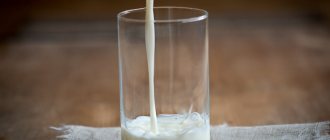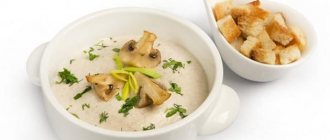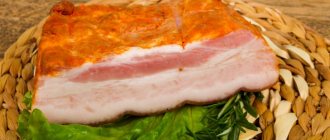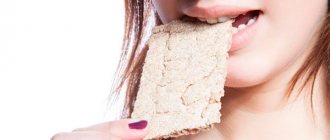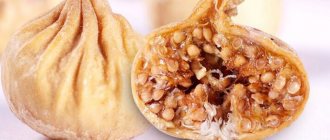Everyone knows about the dangers of seeds, especially fried ones. Such a product negatively affects digestion and can even cause ulcers, worsens the condition of teeth and causes bad habits. However, a small amount of sunflower kernels can even be beneficial. Let's find out at what age you can give your child seeds.
Composition and benefits
Sunflower kernels include protein, dietary fiber and important amino acids, vitamins D, F and E, B vitamins. The product contains magnesium and phosphorus, potassium and fluorine, manganese and zinc. Sunflower seeds perform the following beneficial functions:
- Improve lipid metabolism and water balance;
- Regulate the level of bad cholesterol;
- Increases the absorption of iron in the body;
- Strengthen bones and prevent the development of rickets, which often appears in young children;
- Stabilizes digestion and stimulates intestinal motility, eliminates constipation;
- Positively affect the condition of nerve cells;
- Increase visual acuity and improve eye health;
- Strengthen cell membranes and protect nerve fibers;
- Stimulate blood circulation, strengthen the heart and blood vessels;
- Cleanse the body and improve the condition of the skin, remove toxins and relieve dry skin;
- They improve mood, relieve stress, fatigue and despondency, and help with increased nervousness and moodiness.
Peeled seeds contain an increased number of vitamins and nutrients, so this product can be consumed if you have vitamin deficiency. And raw kernels also increase appetite. However, they can also cause serious harm to the body.
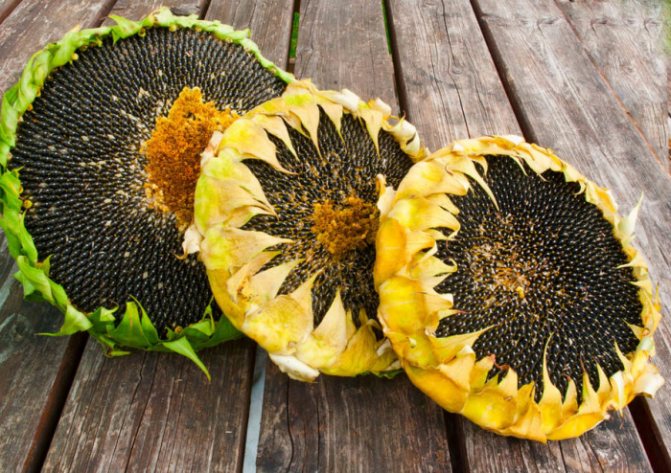
Sunflower seeds: composition
25% of sunflower kernels consist of protein with essential amino acids. One of them, methionine, is extremely important for lipid metabolism. It contains unsaturated fatty acids, due to which the substance has a positive effect on cholesterol levels. The peeled sunflower seed contains everything: vitamins, minerals, and especially a lot of magnesium, the same thing that is why it is recommended to eat mostly black bread. Also in the kernels there is:
- Vitamin D - children need it from the first months of life to avoid rickets. In terms of the content of this element, sunflower seeds are superior even to cod liver.
- Vitamin E is an antioxidant, normalizes the functioning of the digestive tract, is good for the eyes, and is also used to prevent many diseases.
- Vitamin F - we do not produce them, we can only get them from foods. This vitamin is a combination of unsaturated fatty acids: arachidonic, linoleic, linolenic and oleic. Thanks to them, cell membranes are strengthened and the protection of nerve fibers is increased.
- Phytin is a special substance containing phosphorus, strengthens bones, is beneficial for the nervous system, and stimulates hematopoiesis.
- Carotenoids - these include a group of substances that give a characteristic yellow or orange tint to vegetables and fruits. Removes toxins and has a positive effect on the functioning of the cardiovascular system.
Sunflower kernels contain many important minerals: iodine, manganese, copper, zinc, fluorine and many others. They are significantly higher in potassium concentration than bananas. The seeds also contain B vitamins, which have a positive effect on the nervous system and also increase the absorption of iron.
Negative consequences
Seeds are a high-calorie product, containing 520 kcal per hundred grams. Overeating will lead to weight gain. Due to the increased fat content, grains can negatively affect digestion, cause pain, heaviness and discomfort in the stomach, and disrupt bowel movements.
Cracking seeds between your teeth will seriously damage your tooth enamel. If you regularly clean the seeds in this way, characteristic damage will soon appear on the two front teeth, which will gradually increase. As a result, cracks or even chipping may occur.
In addition, the product provokes darkening of tooth enamel, the appearance of tartar, crumbling and destruction of teeth, the development of caries and other similar problems. Therefore, you only need to peel the grains by hand, and give the children the product already peeled.
The most dangerous are old raw seeds that have already lost their nutrients. At the same time, cadmium accumulates in the product. This is a toxic and harmful substance that disrupts the functioning of internal organs, causes hypertension, liver and kidney diseases.
A sore throat is another problem that can arise when you overuse seeds. If your child has a cold or allergies, they will only make the cough worse and cause throat irritation. Seeds are also dangerous for small children because they can easily choke on a small grain.
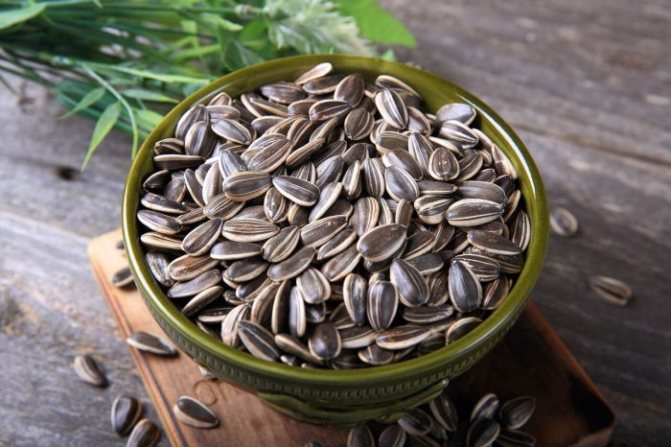
At what age can it be given to children?
Seeds are a high-calorie, allergenic and small product, so they are not recommended for too small a child. Experts advise giving grains to a child no earlier than three years of age. Buy classic raw seeds in the skin, without various additives. Before eating, peel the kernels yourself and lightly fry in a frying pan without oil.
The seeds can be eaten not only separately, but also added to recipes for various dishes. They go well with vegetable salads, stews, cereals and main courses, and are suitable for decorating baked goods and desserts.
The daily norm should not exceed 50 grams. You should not give seeds to children with individual intolerance, with chronic diseases of the gastrointestinal tract, kidneys and liver, with sore throat and sore throat. They are not recommended if you are overweight.
First, clean the grains yourself and gradually teach your baby to do this. Explain that you cannot eat seeds with the skin on. Make sure that the baby does not choke on small seeds. If this does happen, what to do in this case, see here.
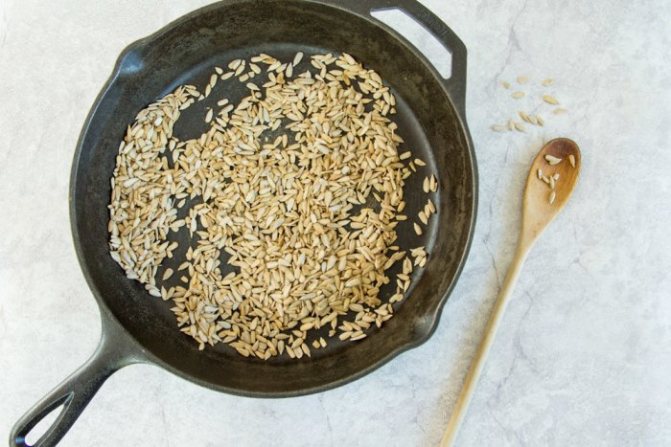
Why not for babies?
It must be said that, in addition to its benefits, melon can cause harm, especially for those children who have not yet reached 12 months of age. This juicy delicacy is not without its drawbacks.
- Poor digestion by the gastrointestinal tract in large quantities. That is why pediatricians do not recommend giving it to children under one year old.
If the baby has crossed the life line of 12 months, then he can be offered to try a small piece, but only cut off from the fruit that grew on his own plot. The famous pediatrician Evgeny Komarovsky still recommends giving this product only when the baby turns 2 years old.
- Possible flatulence and diarrhea in children. If you want to introduce melon into the diet of a baby who is over 12 months old, then please note that it is better to give it separately from all food. Only in this case it will not cause such consequences for him.
- Allergic reaction. If you start giving melon to a baby who is only a few months old, then watch him for a while. If you notice an allergic reaction, consult your doctor immediately for advice.
- Nitrates that accumulate in the product. The fruit may simply be stuffed with them. As a result, the baby may become ill not from the product itself, but from the nitrates in it. Therefore, it is dangerous to buy early varieties. Purchase melons at their natural ripening time. Remember also that nitrates are highest near the crust.
- Favorable environment for the growth of microbes. It is this that can become the culprit of intestinal infection in children if the fruits are not stored correctly, especially when the baby is several months old.
Useful: Goji berries for children: can they be used as vitamins?
So, we can summarize everything and say unequivocally that melon is not allowed for a baby:
- one year old;
- if he has diarrhea;
- if he has problems with the stomach or intestines;
- if he has diabetes.
It can be recommended by a doctor to a child under one year old if the baby has kidney problems.
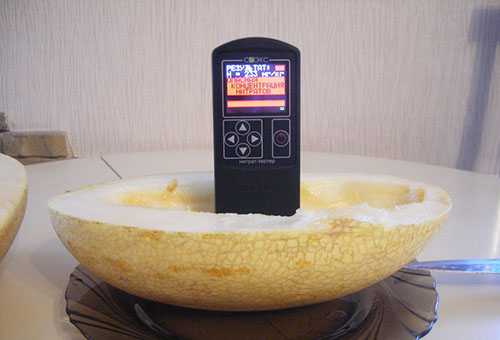
How to choose and prepare seeds
Do not buy seeds that have already been peeled, as they have already lost their beneficial properties and taste. In addition, they have a short shelf life. It is not recommended to give the seeds raw, but you should not expose them to too much heat either.
Drying or lightly frying is a suitable option. This treatment will eliminate harmful microorganisms and preserve beneficial substances. Before cooking, rinse thoroughly and dry, pour into a hot frying pan without oil. Fry for about five minutes, constantly stirring the kernels. Make sure they don't burn.
If you don't want to give roasted seeds, you can dry them. To do this, place the washed and dry grains on a baking sheet or other suitable container in one thin layer. We leave it for four hours on the balcony or windowsill in direct sunlight or lay it out on the radiator. Stir the grains periodically.
In addition, the product can be dried in the oven. Place the baking sheet in a preheated oven for twenty minutes at a temperature of 160-180 degrees. Lightly roasted or dried seeds in a small volume will be beneficial for the child’s body.
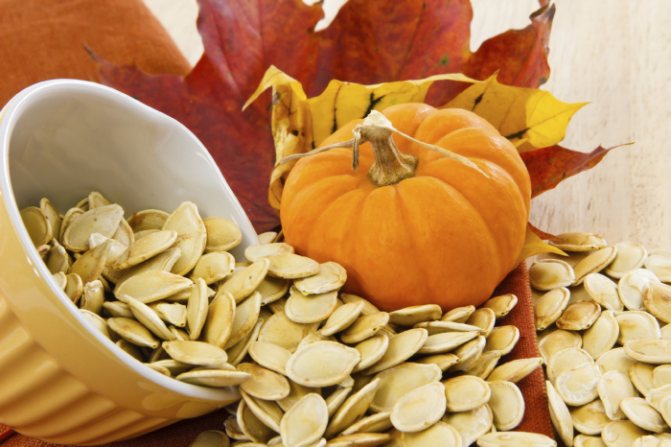
How do doctors advise giving seeds to children?
To prepare pumpkin or sunflower seeds, you need them:
- be sure to rinse under running warm water;
- After this, dry the seeds well;
- place in a preheated frying pan without oil;
- fry over low heat for no more than 5 minutes, while constantly stirring the seeds.
As a result, they should become softer and acquire a pleasant aroma.
If you fry the seeds correctly, you will be able to preserve all the beneficial substances present in the product. And thanks to this, it will be possible to normalize all body functions important for children’s health.
Is it possible to give pumpkin seeds?
It has been proven that pumpkin seeds are healthier than sunflower seeds. They increase immunity and preserve the body's defenses, strengthen joints and bones. They improve the functioning of digestion and nerve cells, the hormonal and endocrine systems. This is an excellent prevention of urolithiasis. By the way, pumpkin seeds will help if your child gets motion sickness.
Pumpkin seeds contain cucurbitin, which kills worms. They are lower in calories and contain more protein than sunflower kernels. This is an excellent source of energy, which contains easily digestible carbohydrates and tones the body. It contains magnesium and zinc, iron and other beneficial substances.
Rinse thoroughly and lightly dry the pumpkin seeds in the oven, on a radiator or in the sun and give them to your baby or eat the product raw. Don't forget to clean the beans first. They go well with honey and can be components of various dishes. Add pumpkin and sunflower seeds to recipes for children.
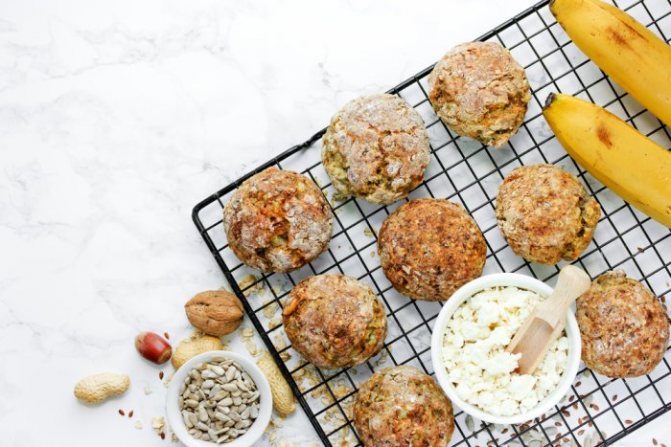
Recipes for dishes with seeds
Banana cookies
- Banana – 4 pieces;
- Oat flakes – 400 grams;
- Seeds – 100 grams;
- Raisins – 100 grams.
Soak the raisins in cold water for half an hour. Wash and peel the bananas, chop in a blender. Add oatmeal and beat again. Add peeled seeds and raisins to the resulting mass, mix and leave for five minutes. Form cookies and bake for ten minutes at 170 degrees.
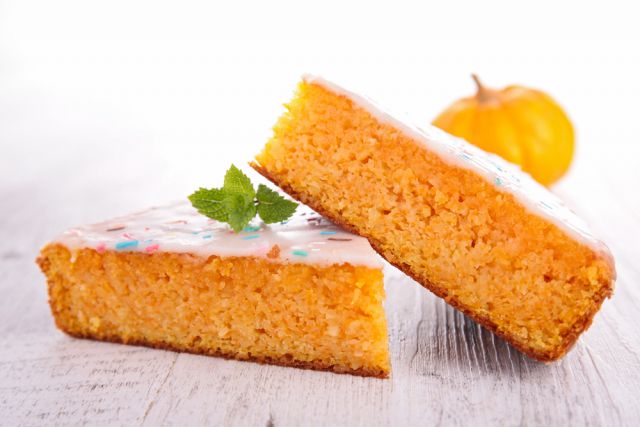
Pumpkin pie with cheese
- Flour – 1 glass;
- Water – 1 table. spoons;
- Butter – 140 grams;
- Pumpkin – 300 grams;
- Sugar – 1 table. spoon;
- Goat cheese – 150 grams;
- Pumpkin seeds – 1 table. spoon.
Mix flour with a pinch of salt. Grind 120 grams of butter, put it in flour and add water, knead the dough and put it in the refrigerator for half an hour. Roll out the mass and place in a baking container. Cut the pumpkin into thin slices and place on top.
Sprinkle the dough with sugar and pieces of the remaining butter. Bake for 20-30 minutes at 200 degrees. Peel the seeds, grate or finely chop the cheese. Sprinkle the pie with cheese and grains and place in the oven for another ten minutes.
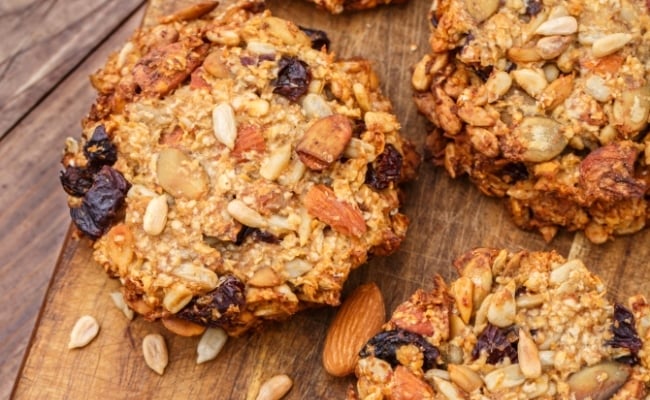
Muesli bar
- Walnuts – 50 grams;
- Almonds – 50 grams;
- Prunes – 50 grams;
- Dried apricots – 50 grams;
- Pumpkin seeds – 10 grams;
- Sunflower seeds – 10 grams;
- Sesame seeds – 10 grams;
- Honey – 40 grams.
Soak dried fruits in cold water for ten minutes, drain and rinse. Chop almonds and walnuts, prunes and dried apricots, mix and pour honey. Roll into a ball and put in the refrigerator for half an hour. After this, divide the mass into three equal parts and roll in seeds. Wrap the mixture in cling film, form bars and put them in the freezer for another half hour.
We cut the products into rings.
These energy bars will be an excellent snack for children at school, after sports clubs, during games and walks. They charge you with vigor, increase efficiency and endurance, relieve fatigue and give strength. For more information about what kind of candy bars you can give to children, read the link /. Subscribe to our VKontakte group
Seeds in children's diet
The advice of many mothers varies. Some say that they introduced seeds into the child’s diet at the age of 1-1.5 years. Some say much later. Because of this difference in advice, new mothers often wonder what age of the child is most optimal for introducing sunflower seeds into the diet.
The optimal age to start eating seeds, like walnuts, is 3 years, but they need to be introduced into the diet gradually. It is recommended to add them to your child's daily food. It is better to initially grind them in a blender. After three days of such use, it is necessary to look at the child’s body’s reaction to the new product. If no rash or redness appears on the skin, you can continue introducing it into the diet.


